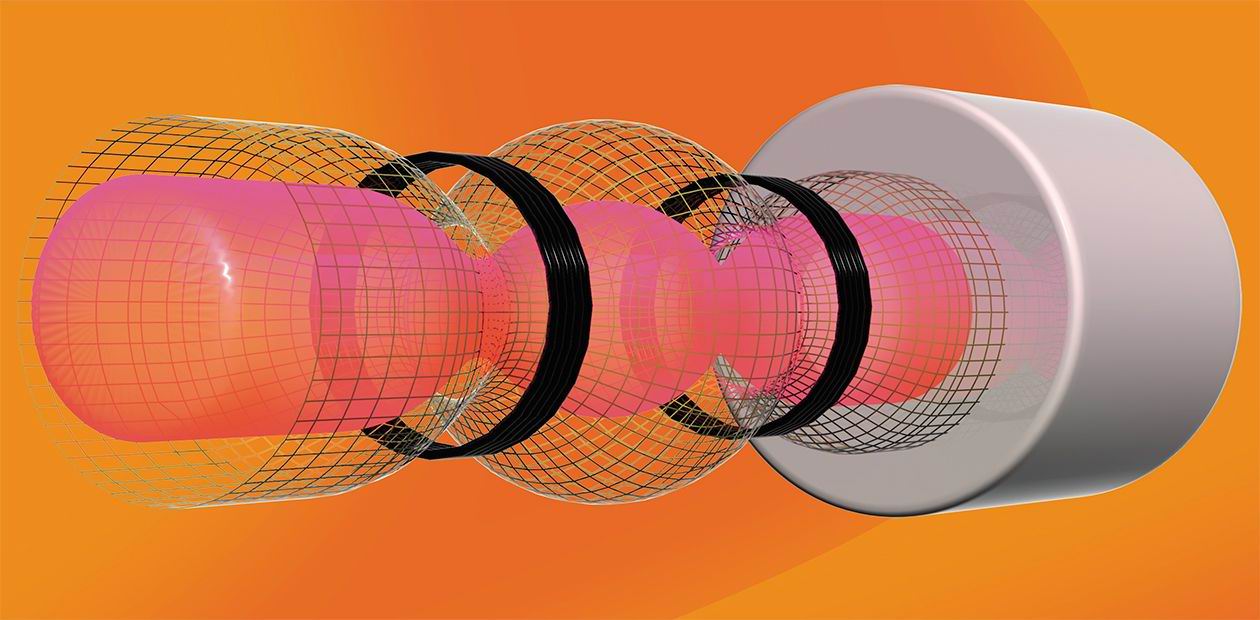Trap for Fusion
Like all research institutes of the Siberian Branch of the Russian Academy of Sciences, the Budker Institute of Nuclear Physics (INP) is comparatively young: it will celebrate its 50th anniversary in 2008, and 50 is also the mean age of its workers. It is reassuring to see that now many graduate students and undergraduates are working at the INP, and that these young scientists are planning to continue research at this institute. It is well known that young people tend to join organizations that offer interesting work and career prospects. There is no doubt that the INP is able to offer good prospects. It should also be emphasized that extremely complicated modern experiments require efforts of a powerful team of like-minded fellows rather than of one person. That is why the inflow of young researchers is so important...
Plasma is mysterious matter possessing the property of self-organization
Plasma is a completely or partly ionized gas in which the total negative charge of particles equals the total positive charge. Plasma, therefore, is an electrically neutral medium. As physicists say, plasma possesses the property of quasi-neutrality. This state of matter is considered to be the fourth aggregate state (in addition to solid, liquid, and gaseous states) and is the natural form of existence at temperatures of about 10,000 °C and higher.
This unusual state of matter in nature has been studied for more than a century. Since the second half of the 20th century, the main direction of research has been focused upon controlled nuclear fusion with the aim of fusion power release for the production of electricity. High-temperature plasmoids are frequently encountered in the universe: it suffices to name the sun and the stars, while on the Earth one can find only a small amount of plasma. Space particles and the solar wind ionize the upper layer of the atmospheric shell of the Earth (ionosphere), and the formed plasma is confined by the magnetic field of the Earth. In other words, this is something like the earth’s magnetic trap. During enhanced solar activity, the flow of charged particles of the solar wind deforms the earth’s magnetosphere. Owing to the development of hydromagnetic instabilities, the plasma penetrates into the upper atmosphere near the poles; atmospheric gases, interacting with the charged particles of the plasma, become excited and start glowing. This is the basis for the “aurora polaris,” a phenomenon that can be observed near the poles only.
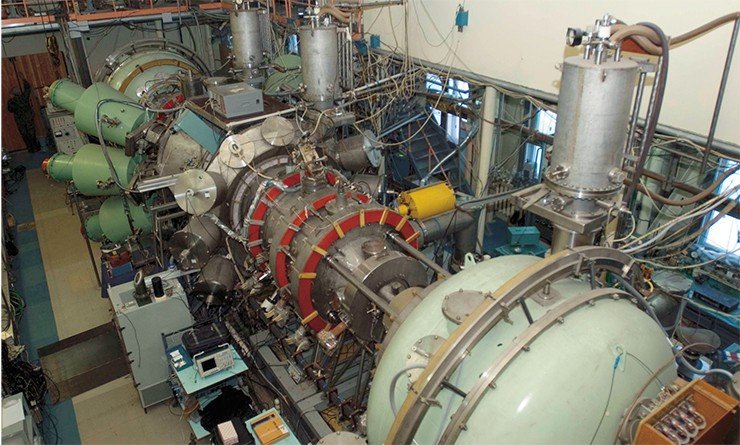
In addition to the main direction in plasma physics research, there are also various applications which are just as important. These applications include numerous new technologies: plasma cutting, welding of metals, and processing of metal surfaces. Plasma can be used as the working medium in spacecraft engines and luminescent lamps. The use of plasma-based technologies caused a real boom in microelectronics. One advantage was the efficiency of processors and an increase in the memory volume; the amount of chemicals used in microelectronics production was substantially reduced, which minimized the degree of environmental contamination.
Dense high-temperature plasma exists only in the stars; on the earth it can be obtained only under laboratory conditions. This unusual state of matter impresses us with a great number of degrees of freedom; at the same time it is capable of self-organization and response to external force. For instance, it is possible to confine plasma in a magnetic field and make it take various forms. Nevertheless, plasma tends to acquire a state that is most beneficial in terms of energy, which often leads to the development of various instabilities. Like a living being, plasma strives to escape from the rigid “cage” of the magnetic trap if it is not satisfied with the configuration of this trap. That is why a real challenge to physicists is to create conditions for plasma to be stable, to “live” peacefully in the trap for a long time, and to get heated to thermonuclear temperatures of the order of 10 million degrees Celsius.
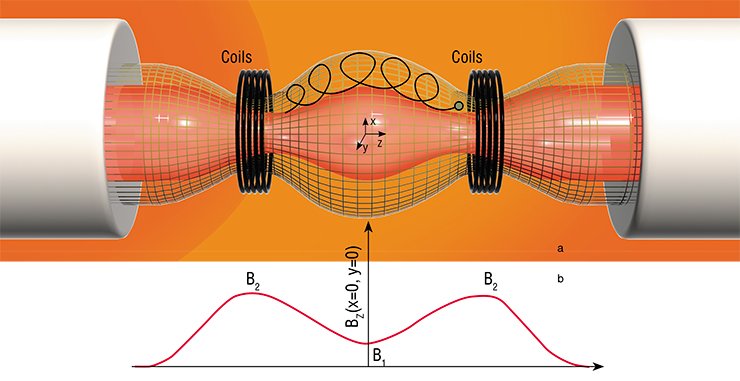
Today, two unique large plasma traps successfully operate at the INP. These traps were created by putting the unique ideas and principles developed at the INP into practice. These are open-type traps, which are considerably different from the popular closed magnetic systems. They are impressive both because of their mysterious grandness and due to the simplicity of operation. While working with these facilities, the scientists managed to achieve important results on heating and confining hot dense plasma as well as to make a number of discoveries associated with the basic properties of this fourth state of matter. Each year brought new, unusual facts concerning the plasma “life” in traps; they were the result of varying the magnetic field configuration, applying electric fields, using various admixtures, injecting powerful beams, and “probing” plasma in different ways. “Responding” to these actions, Plasma, though reluctantly, had to share its most precious secrets.
Gas-dynamic trap
The gas-dynamic trap (GDT) was constructed in the Budker Institute of Nuclear Physics in Novosibirsk in 1986. This is an open magnetic system for plasma confinement.
The magnetic field configuration in the classical axial-symmetric magnetic trap is an extended region of a homogeneous magnetic field with peaks at the edges, which are ensured by coils generating a strong magnetic field. The regions under these coils (those regions of space occupied by the magnetic field where the field reaches the maximum value) are usually called the “magnetic mirrors,” and the trap based on such a principle is called a mirror trap or “Mirrors”. So in the simplest case, the magnetic field in the mirror trap is generated by mirror coils only.
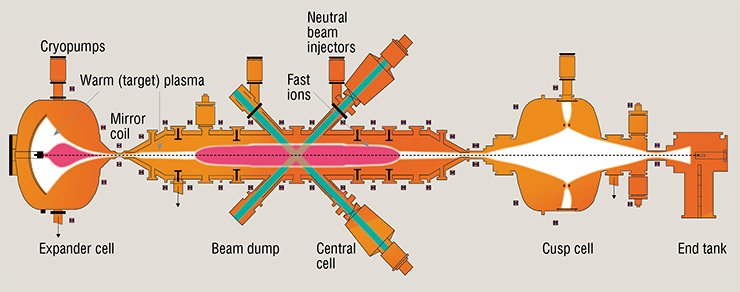
The charged particles of plasma (negative electrons and positive ions) move along the force lines of the magnetic field between the magnetic mirrors and are reflected from them, thus, performing oscillatory motions. Particles whose kinetic energy is sufficient to overcome the potential barrier of the mirror leave the trap within one flight.
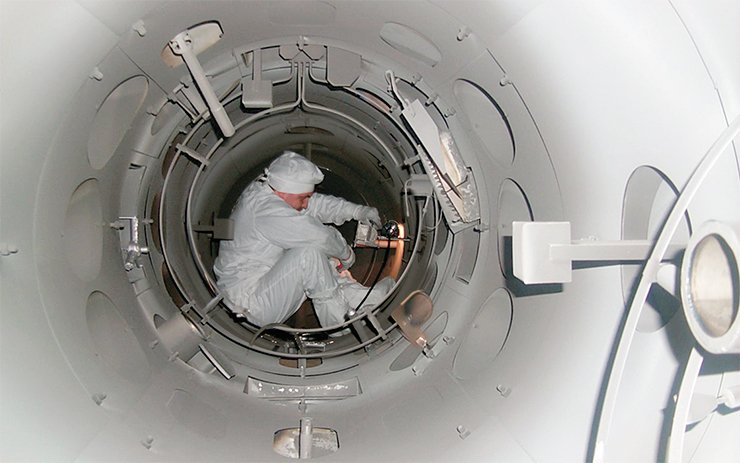
The differences of the gas-dynamic trap (GDT) from the usual mirror trap described above are the large length of the central cell with the homogeneous field and a very large “mirror ratio” (ratio R = B1/B2 of the magnetic field values in the mirror and in the trap center). In this case the mean free path of ions is small, as compared with the length of the homogeneous magnetic field segment. Plasma flow from the GDT, therefore, obeys the gas dynamics laws, similar to gas outflow from a container into vacuum through a small hole (which suggested the name of the GDT device). Making the “holes” in magnetic field very small and the volume occupied by the plasma very large, one can reach the plasma-confinement time sufficient for a controlled nuclear fusion. The length of such a GDT-reactor, however, will be several kilometers. Nevertheless, using various devices, the so-called ambipolar plugs, which reduce the plasma flow from the trap, will allow the trap length to be reasonably long. Therefore, the reactor prospects of gas dynamic trap still remain attractive. The most promising fusion application of the plasma-confinement scheme is a GDT-based simple and reliable source of fast neutrons with energy of 14 MeV, which are generated in the fusion reaction of deuterium and tritium. Actually, this is the same fusion reactor (but with a low efficiency), which consumes energy and produces neutrons. Such a neutron source can be used for material testing of the first wall of the future industrial fusion plant or for driving a subcritical fission reactor with ensures the safety of modern nuclear power plants. The researchers of the Budker Institute of Nuclear Physics have been developing the project of the GDT-based neutron source for many years. To test the theoretical predictions in practice and to accumulate a plasma-physics database for creating a neutron source, the INP scientists developed an experimental model of a gas-dynamic trap.
The research community dealing with the CTS problem has started constructing the greatest tokamak-type plasma trap called ITER. In the nearest decades, ITER is expected to demonstrate that a self-sustained controlled thermonuclear power station operating on the basis of the deuterium and tritium synthesis reaction is feasible.Obviously, for further developing thermonuclear power engineering and for constructing power stations that would operate for decades and even centuries one has to choose reliable materials that can withstand strong neutron flows during the entire service life. To test such materials, a powerful source of neutrons is needed. A project of such a source of neutrons on the basis of the gas-dynamic trap has been under development at the INP for many years.
All physical principles that form the basis for a compact and comparatively inexpensive source of neutrons on the basis of an open gas-dynamic trap are now being studied in real experiments on plasma accumulation, its confinement and heating in the GDT facility. Researchers are taking direct measurements of the emitted neutron flow in experiments with deuterium injection . The deuterium-deuterium synthesis reaction with these experimental parameters actually provides a small flow, as compared with the deuterium-tritium reaction. They are sufficient, nevertheless, to verify model calculations, which are planned for calculating the reactor (source). In December 2007 the facility was 22 years old: the first plasma was obtained at the end of 1985. Those who constructed the facility and started it working still work in the laboratory. Today’s team, however, also includes young and enthusiastic workers; some of them are of the same age as the GDT facility
The main element of the GDT experimental device is an axial-symmetric mirror trap 7 m long with a field of 0.3 T in the center and up to 10 T in the mirrors, which is designed to confine two-component plasma.
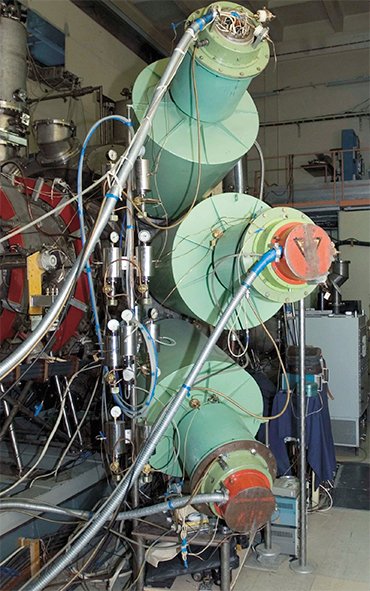 One of the components, the hot “target” plasma, has a temperature of electrons and ions up to 100 eV (approximately 1,200,000 °C) and a density of ~ 5•1019 particles per cubic meter. This component is confined in the gas-dynamic regime that is described above. The other component is fast ion population with a mean energy of ~ 10,000 eV and a density up to 2•1019 particles per cubic meter. It is formed as a result of ionization in the target plasma of powerful beams of atoms injected obliquely into the trap with the help of special devices: neutral beam injectors A typical feature of this fast component is the same regime of confinement that operates in the classical mirror trap: fast ions move over magnetic orbits along the magnetic force lines and are reflected from the region of the strong magnetic field. Thereby, fast ions slow down during their interaction with target-plasma particles (mainly electrons) and heat the target plasma up to 150 eV and higher. In the case of oblique injection and small angular scattering of particles, the density of fast ions has strong peaks near the region of reflection, and this circumstance is the most attractive for implementing the neutron source. It should be noted that the neutron flux in the fusion reaction is proportional to the squared density of deuterium and tritium ions. With this peaked density, therefore, the high flux is prodused only in the region near the reflection point where the “test zone” is located. The remaining space in the facility experiences much smaller neutron loading, which makes it possible to avoid using expensive neutron protection of all units of the device.
One of the components, the hot “target” plasma, has a temperature of electrons and ions up to 100 eV (approximately 1,200,000 °C) and a density of ~ 5•1019 particles per cubic meter. This component is confined in the gas-dynamic regime that is described above. The other component is fast ion population with a mean energy of ~ 10,000 eV and a density up to 2•1019 particles per cubic meter. It is formed as a result of ionization in the target plasma of powerful beams of atoms injected obliquely into the trap with the help of special devices: neutral beam injectors A typical feature of this fast component is the same regime of confinement that operates in the classical mirror trap: fast ions move over magnetic orbits along the magnetic force lines and are reflected from the region of the strong magnetic field. Thereby, fast ions slow down during their interaction with target-plasma particles (mainly electrons) and heat the target plasma up to 150 eV and higher. In the case of oblique injection and small angular scattering of particles, the density of fast ions has strong peaks near the region of reflection, and this circumstance is the most attractive for implementing the neutron source. It should be noted that the neutron flux in the fusion reaction is proportional to the squared density of deuterium and tritium ions. With this peaked density, therefore, the high flux is prodused only in the region near the reflection point where the “test zone” is located. The remaining space in the facility experiences much smaller neutron loading, which makes it possible to avoid using expensive neutron protection of all units of the device.
An important problem in creating a reactor and a neutron source on the basis of an axial symmetric mirror trap is plasma stabilization across the magnetic field. In the GDT scheme, plasma is stabilized by special additional end-cells with a magnetic field profile favorable for stability; the cells are located behind the magnetic mirrors and ensure reliable stabilization of the all plasma.
Another important problem of controlled nuclear fusion on the basis of open traps is thermal insulation of the plasma from the end wall. In contrast to closed systems, such as tokamaks or stellarators, plasma leaves the open trap and impinges onto plasma absorbor. Cold electrons emitted under the flow from the absorber surface can penetrate back into the trap and cool the plasma to a substantial extent. In experiments on studying longitudinal confinement in the GDT, it was demonstrated that the expanding magnetic field behind the mirror in end tank (“expander”) prevents the penetration of cold electrons into the trap and provides effective thermal insulation from the end wall.
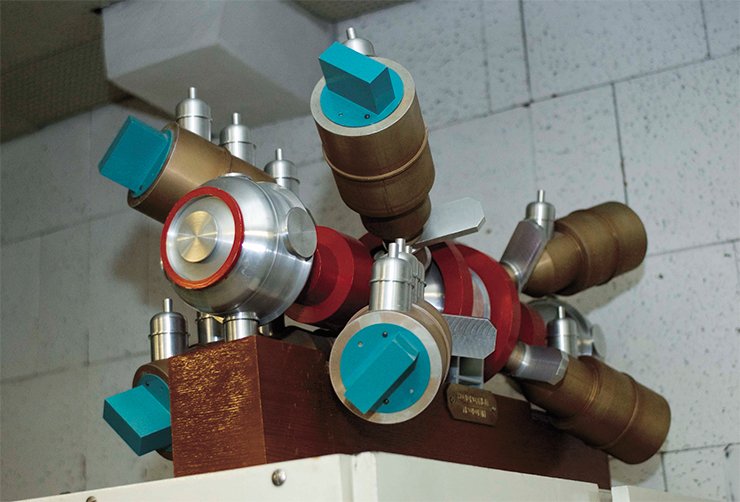
The permanent activity within the framework of the GDT experimental program, aimes at increasing stability and temperature of target plasma, pressure and density of fast ions as well as at studying the plasma behavior in different operation conditions of the device, etc. Fundamental properties of the plasma are also examined. It should be emphasized that the range of plasma-related scientific interests and investigations is rather wide.
The gas-dynamic trap is equipped with the set of modern diagnostics. Most of them have been developed in our laboratory and are delivered on a contractual basis to other plasma laboratories, including foreign research centers.
The team of scientists, engineers, and technicians involved into GDT research is small but extremely industrious. The high skills of all team members allow them to achieve important results. In addition, the scientific staff is permanently replenished with “young blood,” namely, graduates from Novosibirsk State University and Novosibirsk State Technical University. Undergraduates are trained in the laboratory and take an active part in experiments, thus directly contributing to the creation of new knowledge. After doing their first yearly project, they stay for training at the laboratory, successfully defend their diploma theses, become graduate students, and write their dissertations. We have to confess that as scientific supervisors we are extremely happy about this.
Another trap — GOL-3 — and a slightly different viewpoint on fusion
The world lacks of electricity, and this problem will become of primary importance in the near future: the reserves of fuels (oil and gas) used for operating of modern power stations, alas, will soon be exhausted. That is why the basis of power engineering in the future is expected to be the fusion reactor.
Thermonuclear reactions are reactions of synthesis of light nuclei, for instance, of hydrogen isotopes deuterium and tritium, where large amounts of energy are released. These reactions proceed at high temperatures of more than 10 million degrees Celsius. It is known that all substances transform to the plasma state at temperatures above 10 thousand degrees Celsius. A contact with a solid leads to instantaneous cooling of plasma and to the explosive failure of the solid’s surface; therefore plasma has to be insulated from the solid structure. It is for this purpose that plasma is placed into a magnetic field.
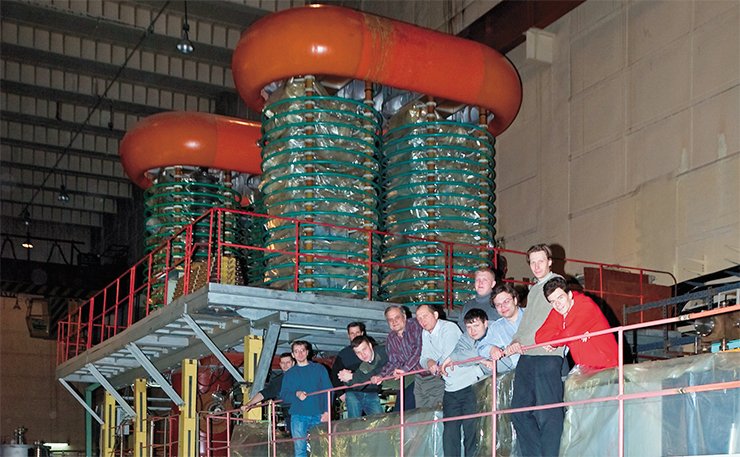
It is extremely difficult to heat the substance to tremendous temperatures and to confine it for a long time in a magnetic field; that is why many specialists believe that controlled fusion is one of the most complicated problems that the humankind has ever faced.
The GOL-3 facility of the Institute of Nuclear Physics is designed for heating and confining thermonuclear plasma in a multimirror magnetic field. The facility consists of three basic parts: a U-2 accelerator, 12-m solenoid (a unit for generating a strong magnetic field), and exit unit.
The electron beam used in the facility is created by the U-2 accelerator, which is the most powerful accelerator of this class in the world. In the accelerator, the electrons are pulled out by the electric field from an explosion-emission cathode and are accelerated by a voltage of about 1 million volts. At a current of 50,000 amperes, the power of the system reaches 50 GW. (The entire city of Novosibirsk utilizes 1/20 of this amount of energy during the daytime.) The beam duration is approximately 8 microseconds and contains up to 200,000 joules of energy, which is equivalent to an explosion of a grenade.
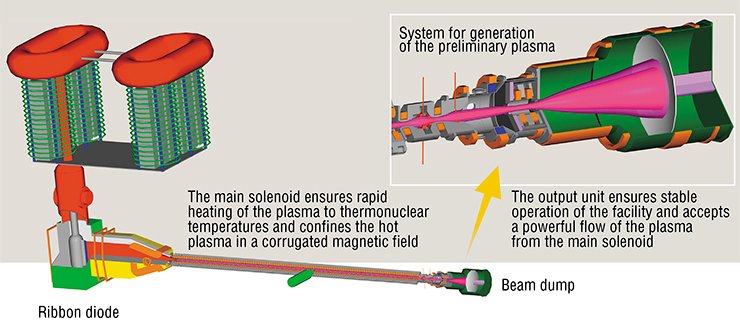
In the main solenoid, the developing of two stream instability causes a high level of microscopic turbulence when the beam flies in the deuterium plasma with a density of
n = 1020—1022 particles per cubic meter, and the beam loses up to 40 % of its energy, imparting it to the plasma electrons. The heating rate is extremely high: it takes plasma electrons during 3—4 microseconds to be heated to temperatures of the order of 2,000—4,000 eV (23—46 million degrees Celsius: 1 eV = 11,600 °C) — this is the world record for open traps. By comparison, the temperature in the 2XIIB facility constructed in the USA stayed within 300 eV against 2,000—4,000 eV in GOL-3.
The magnetic field in the main solenoid consists of many mirrors (55 magnetic cells), i.e., the field maximums (5 T) and minimums (3 T) alternate, the distance between the maximums (22 cm) being of the order of the mean free path of ions. What is the result? If an ion leaves an individual magnetic cell and flies along the magnetic field, it will hit another particle in the neighboring magnetic cell; as a result, it may be captured by the neighboring magnetic cell and will “forget” where it was flying. Thus, the spreading of plasma out of the trap is substantially decelerated. The time of hot plasma confinement in GOL-3 reaches 1 millisecond, which has to be recognized as an undoubted achievement of the scientists.
The use of many mirrors leads to inhomogeneous energy transfer from the beam to the plasma electrons: the heating of electrons is higher at places where the magnetic field is stronger. In case of heating with a beam, the high level of turbulence favors strong (by more than a factor of 1,000) suppression of electron heat conduction. Therefore, temperature inhomogeneities are not leveled off; hence, essential differences in the pressure of plasma arise. For this reason, the plasma starts moving as a whole. Two opposing plasma flows start moving from high-pressure regions toward pressure minimums. These flows collide and become heated to a temperature of 1—2 keV (slightly higher than that in the center of the Sun). This mechanism of rapid heating was discovered in GOL-3 experiments four years ago. According to the theory, the process had to be accompanied by drastic changes in plasma density, which were then discovered by the method of Thompson scattering of the laser beam.
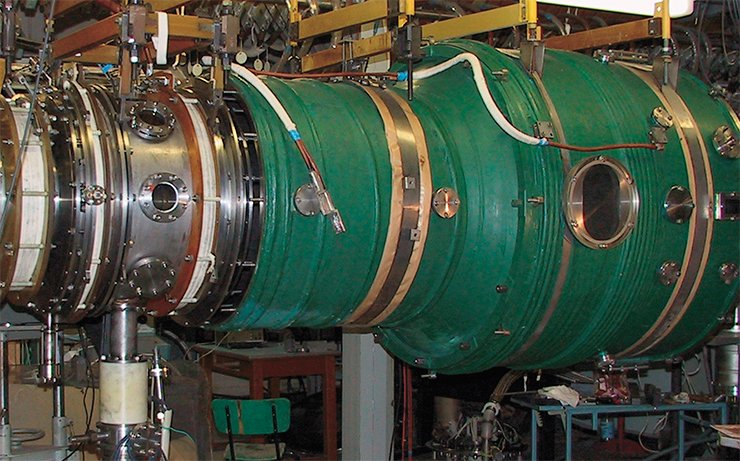
After flying through the main solenoid, the beam enters the output unit, capable of surviving the action of a powerful electron beam as well as a plasma flow. For this to happen, the magnetic field in the output unit has to be diverging, which decreases the energy density in the beam by a factor of 50, and the beam dump has to be made of graphite. Graphite has the following distinctive features: first, it has no liquid phase and it evaporates immediately; second, it has low density (2 g/cm3); hence, the mean free path of electrons in graphite is greater than that in metals Consequently, energy is released in a greater volume and does not exceed the threshold of explosive failure of graphite; hence, the graphite erosion is low (about 1 micron during one shot). The presence of a powerful plasma flow at the facility exit allows to perform experiments on irradiation of materials for the future fusion reactors: these reactors are expected to experience such a high heat load that cannot be created today in other plasma facilities.
Another important problem that can be solved with the help of the output unit is safe transportation of the beam through the main solenoid. The main difficulty is as follows: the beam current in the solenoid (30 kA) is greater than the stability threshold (12 kA for GOL-3). Therefore, the beam is unstable and can be ejected onto the wall or onto the internal chamber structures and destroy them. To avoid such a situation, a discharge has to be initiated in the output unit prior to the beam injection; then the main solenoid will be filled with comparatively cold (several electron volts) preliminary plasma, where an opposing current is induced when the electron beam is injected. This current completely compensates for the beam current, which ensures the stability of the system as a whole (the total current does not exceed 3 kA).
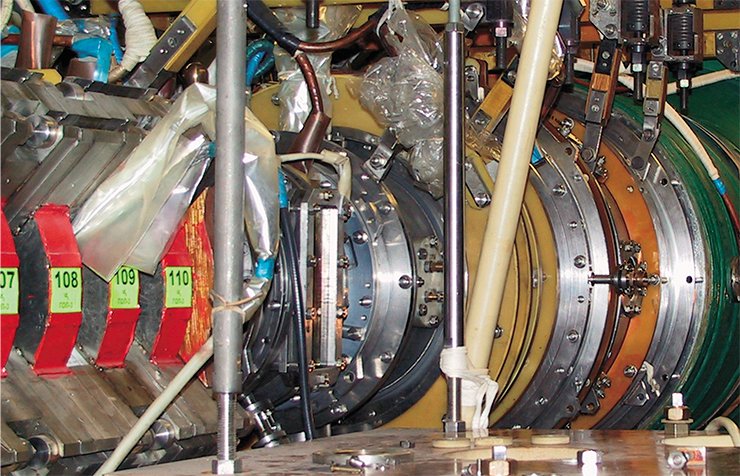
One of the most serious problems of controlled fusionis plasma stability, i. e., creating the conditions where plasma cannot leave the trap across the magnetic field because of the development of various plasma instabilities. Flute instability is the most dangerous one for open traps. If this instability arises, the plasma pulls apart the magnetic force lines and slips outward between these lines. In the plasma generated in GOL-3, this instability is suppressed owing to a shear in the magnetic force lines at different radii of the plasma; the shear arises due to the complicated configuration of currents in the plasma. The beam current flows in the center of the plasma, and a high level of turbulence is also observed there. The backward current flows over the plasma, but its resistance in the center increases because of turbulence, and the backward current flows over the surface of the plasma column. The rectilinear current generates a surrounding circular magnetic field, which is combined with the longitudinal field generated by the solenoid. As a result, a helical magnetic field is formed. The current is different at different radii (and it flows in different directions); therefore, both the helical pitch and direction are also different. That is why the plasma flute pulling apart the magnetic force lines on one radius encounters the force lines at another angle and cannot move them apart: thus, flute instability is suppressed.
Another difficult problem is probing hot plasma, i. e., determining its temperature, composition, density, magnetic field strength, etc. It is not possible to put a thermometer there, because it may explode, and the plasma cool down. Scientists have to use special methods, which may be active or passive. By using passive methods, one can study what the plasma emits. Using active methods, one can inject, for example, laser light or neutral beams into the plasma and see what happens.
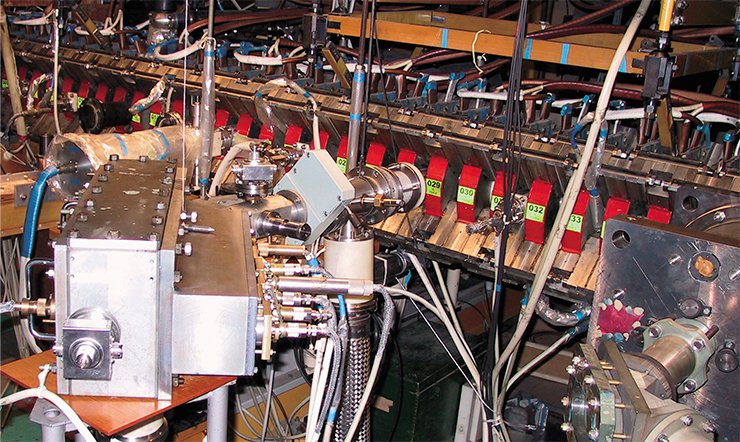
The passive methods used in GOL-3 are detectors and spectrometers of photons in the visible, ultraviolet, X-ray, and gamma ranges; detectors of neutrons, detectors of charge exchange neutrals, diamagnetic loops, and Rogowski coils. The active methods include several laser systems, injectors of neutral beams, and injectors of solid-state particles.
Though currently available devices whose parameters approach those of a reactor are tokamaks (they have high temperatures and long confinement time), mutlimirror traps are also considered as a variant of the fusion reactor, thanks to GOL-3. The plasma density in GOL-3 is almost 100 times that in tokamaks, on the average; in addition, in contrast to tokamaks, this facility has no restrictions in terms of plasma pressure. If the pressure is commensurable with the pressure of the magnetic field (5 T generate a pressure of ~100 atmospheres), the trap passes to the mode of “wall” confinement — the magnetic field ejected from the plasma (plasma is a diamagnetic medium) will concentrat and increase near the chamber walls, still, the field will be capable of plasma confinement. Currently, there is not a single reason that could considerably restrict the growth of the main thermonuclear parameters (n, T, and confinement time) in multimirror traps.
The main problem to be solved by the team of the GOL-3 facility is to develop a concept of the multimirror thermonuclear reactor and to carry out the experimental validation of the basic postulates of this concept.
Plasma research cannot be performed without diagnostics; therefore, the INP developments are well sold. The institute signs contracts on delivery of some probing instruments, and researchers are involved in the developing and assembling of these instruments at the institute’s workshops. These are mainly probing injectors, but also some optical devices, interferometers, etc. Life goes on: the INP knows how to earn money.
References
1. A. Burdakov, A. Azhannikov, V. Astrelin, A. Beklemishev, V. Burmasov, et al. Plasma heating and confinement in GOL-3 multimirror trap // Transactions of Fusion Science and Technology. — 2007. — Vol. 51. — No. 2T. — Pp. 106—111.
2. A. V. Arzhannikov, V. T. Astrelin, A. V. Burdakov, I. A. Ivanov, V. S. Koidan, S. A. Kuznetsov, K. I. Mekler, S. V. Polosatkin, V. V. Postupaev, A. F. Rovenskikh, S. L. Sinitskii, Yu. S. Sulyaev, A. A. Shoshin. Study of the Mechanism for Last Ion Heating in the GOL-3 Multimirror Magnetic Confinement System. //Plasma Physics Reports, Vol.31, No. 6, 2005, pp. 462-475.


